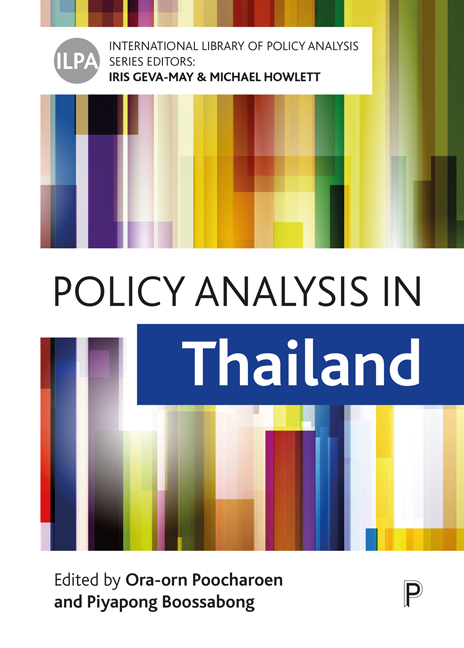Book contents
- Frontmatter
- Contents
- List of figures and tables
- List of abbreviations
- Notes on contributors
- Editors’ introduction to the series
- Introduction
- Part One History, styles and methods of policy analysis in Thailand
- Part Two Policy analysis within executive government
- Part Three Policy analysis beyond executive government
- Part Four Political parties and interest groups in policy analysis
- Part Five Policy analysis education and research
- Index
fourteen - The influence of Thailand’s social movements on policy analysis
Published online by Cambridge University Press: 20 January 2024
- Frontmatter
- Contents
- List of figures and tables
- List of abbreviations
- Notes on contributors
- Editors’ introduction to the series
- Introduction
- Part One History, styles and methods of policy analysis in Thailand
- Part Two Policy analysis within executive government
- Part Three Policy analysis beyond executive government
- Part Four Political parties and interest groups in policy analysis
- Part Five Policy analysis education and research
- Index
Summary
Introduction
Social movements have a considerable impact on Thailand's public policies. They placed their programmes on the political agenda, aided the agenda's passage into policy and supported the enforcement, and even influenced the policy process from within. However, the academic and journalistic explanations for this significant yet scattered issue remain limited. We have an insufficient account of why some movements in Thailand succeeded in pushing for new and alternative policies but others that emerged around the same time or shared similar backgrounds did not. And rarely do we know how high-profile political phenomena that entrenched political polarisation in Thailand such as the confrontation between the Red Shirts and the Yellow Shirts, popularly known as the colour-coded politics, affected the influences of Thailand's social movements over policy processes.
In Thailand, over the decades, we have witnessed a proliferation of civil societies that have morphed into large-scale social movements. Some social movements have highly influenced political movements. Thus, as covered in the previous two chapters on political movements and civil society, the overlaps between the discussion of civil societies, social movements and political movements are inevitable. To shed more light on these issues, this chapter provides an overview of the upsurge and decline of social movements in Thailand. In doing so, it illustrates the political contexts that enabled some movements to capitalise on political resources but constrained the political influences of many. Following this, the chapter explores the cases of the Assembly of the Poor (AOP) and the Rural Doctor Movement (RDM). By focusing on the actions of the AOP and the RDM from the late 1990s to the early 2000s, this chapter reveals how their choices of strategy – confrontation or collaboration – had different impacts on government responses at the policy level.
In addition, comparing the AOP and one of its offspring, namely the Land Reform Network of Thailand (LRNT), this chapter demonstrates that originating in different political contexts, these movements from the same origins employed different strategies and succeeded unequally in exerting influence over public policies.
- Type
- Chapter
- Information
- Policy Analysis in Thailand , pp. 248 - 270Publisher: Bristol University PressPrint publication year: 2023



